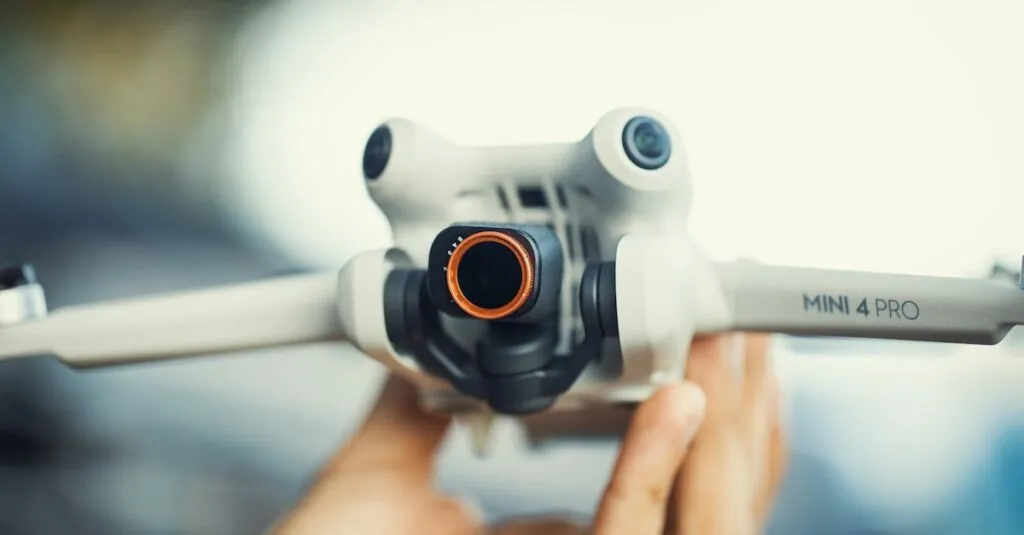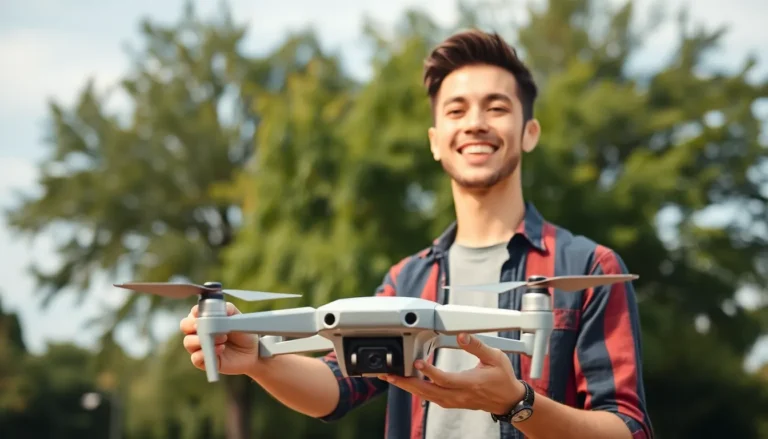Table of Contents
ToggleDrones are buzzing over New Jersey like caffeinated bees, and it’s not just for the thrill of aerial selfies. From capturing stunning landscapes to delivering pizza faster than a speeding bullet, these high-flying gadgets are reshaping the Garden State in ways that might just leave you grinning.
Imagine spotting a drone zipping through the sky, armed with a camera and a mission to document every quirky diner and scenic park. It’s not just about the tech; it’s about how these flying wonders are transforming industries, enhancing safety, and even making the mundane a bit more exciting. Buckle up as we dive into the fascinating world of drones over New Jersey, where innovation meets a slice of humor and a dash of adventure.
Overview of Drones Over New Jersey
Drones in New Jersey play a significant role in various sectors. The state sees drones used for aerial photography, surveying land, and monitoring wildlife. Public safety organizations utilize drones for search and rescue operations, enhancing response times. Businesses also deploy drones for deliveries, making logistics more efficient.
Innovative applications continue to emerge across the state. Drone technology supports environmental monitoring, allowing for better management of natural resources. Agriculture benefits from drones that assess crop health, optimizing yields. Additionally, entertainment companies use drones for capturing stunning visuals at events, raising the bar for outdoor experiences.
New Jersey’s regulations guide drone operations, ensuring safety and privacy. The Federal Aviation Administration governs airspace, while state laws oversee local operations. Operators must follow guidelines, such as maintaining visual line of sight and adhering to altitude restrictions. Compliance fosters a safer environment for both drone enthusiasts and the general public.
Exciting developments are underway in the drone industry. Local universities and tech companies collaborate on research projects, exploring advancements in drone capabilities. These innovations include improved battery life and enhanced navigation systems. As technology evolves, the potential for drones in New Jersey expands, promising new opportunities across various fields.
Types of Drones Used
Drones in New Jersey span various categories, serving both commercial and recreational purposes. Understanding these types reveals their widespread impact across sectors.
Commercial Drones
Commercial drones perform numerous tasks efficiently. Industries such as agriculture rely on them for crop monitoring and precision agriculture. Construction companies deploy drones for site inspections, ensuring safety and improving project timelines. Real estate professionals utilize drones to capture stunning aerial footage, enhancing property listings. Delivery services embrace drone technology to expedite logistics, allowing for faster shipping. Surveying and mapping also benefit, with drones providing detailed topographical data that saves time and resources.
Recreational Drones
Recreational drones attract hobbyists and enthusiasts alike. Many individuals enjoy flying drones for aerial photography, capturing breathtaking landscapes of New Jersey. Racing drones offer a thrilling experience, with users competing in events that test speed and agility. Families often engage in flying drones as a fun outdoor activity, promoting teamwork and creativity. Safety remains a priority, with operators adhering to FAA regulations to ensure responsible flying. As drone technology evolves, new models become available, enhancing user experience and accessibility.
Regulations Governing Drones
Drones in New Jersey operate under strict regulatory frameworks that ensure safety and privacy. Both federal and state regulations play critical roles in managing drone activities.
Federal Regulations
The Federal Aviation Administration (FAA) establishes the primary regulations for drone operations across the United States. All commercial drone operators must obtain a Remote Pilot Certificate, showing proficiency in safe flight operations. Drones must remain below 400 feet, avoid flying near airports, and operate only during daylight. Operators must also maintain visual line of sight with their drone. Compliance with these rules helps prevent accidents and protects public safety.
State Regulations
New Jersey imposes additional regulations that complement federal guidelines. Local laws prohibit drone use in certain public parks and state-owned lands without prior permission. Surveillance laws ensure drones do not infringe on privacy rights. Additionally, New Jersey requires drone operators to register their devices if they weigh more than 0.55 pounds. Adhering to these state regulations fosters responsible drone use and protects residents.
Applications of Drones in New Jersey
Drones play a vital role across various industries in New Jersey, demonstrating their versatility and efficiency. Their applications contribute significantly to agriculture, delivery services, photography, and filmmaking.
Agriculture
Drones assist farmers in monitoring crop health and managing resources effectively. Using advanced sensors, these drones gather data on soil conditions and plant growth. Farmers receive actionable insights, allowing them to make informed decisions that improve yields. Crop spraying becomes more efficient with drones, minimizing chemical use and maximizing coverage. Additionally, historical data analysis through drone imagery enables better future planning for planting and harvesting.
Delivery Services
Various businesses in New Jersey embrace drones for delivery services. Drones reduce delivery time significantly compared to traditional methods. Companies, particularly in food service and retail, utilize drones to transport goods swiftly to customers. Remote areas benefit from drone services, as they ensure deliveries reach consumers without delays. Furthermore, advancements in drone technology enhance navigation systems, leading to safe and efficient deliveries, even in urban environments.
Photography and Filmmaking
Drones revolutionize photography and filmmaking in New Jersey by offering unique aerial perspectives. Filmmakers capture breathtaking landscapes, showcasing the state’s beauty from above. Aerial shots provide a fresh viewpoint for both amateur and professional photographers. Event coverage becomes more dynamic and engaging through drone footage. Clients in real estate also leverage drone technology to create captivating listings, attracting prospective buyers through stunning visuals.
Challenges and Concerns
Drones in New Jersey face various challenges and concerns, influencing their expanded use and acceptance.
Privacy Issues
Privacy issues pose significant challenges for drone operations. Residents often express concerns about unauthorized surveillance from commercial and recreational drones. Local regulations aim to address these concerns by restricting drone access in certain areas, particularly near schools and private properties. Transparency from operators regarding drone usage can help alleviate public fears. Public awareness campaigns educate communities on the benefits of drone technology while highlighting responsible usage and privacy protections.
Environmental Impact
Environmental impact remains a critical concern with the increase of drone flights. Wildlife disturbances can arise when drones intrude into natural habitats, affecting migratory patterns and breeding behaviors. Regulations mandate certain operational guidelines, especially near sensitive areas like parks and wildlife refuges. Environmental monitoring, however, stands as a dual-edged sword. While drones contribute valuable data for ecosystem management, their presence must be carefully balanced to minimize disruptions to the environment. Evaluating long-term ecological effects requires continuous research and thoughtful consideration of how drones affect local ecosystems.
Drones are undeniably reshaping New Jersey’s landscape across various sectors. Their ability to enhance efficiency in agriculture and delivery services while providing stunning aerial views is just the beginning. As technology evolves and applications expand, the potential for drones in public safety and environmental monitoring becomes even more promising.
However, it’s crucial to navigate the challenges associated with privacy and environmental impact. By adhering to regulations and fostering responsible usage, New Jersey can harness the benefits of drones while protecting its residents and natural habitats. The future of drones in the Garden State looks bright, with endless possibilities on the horizon.







